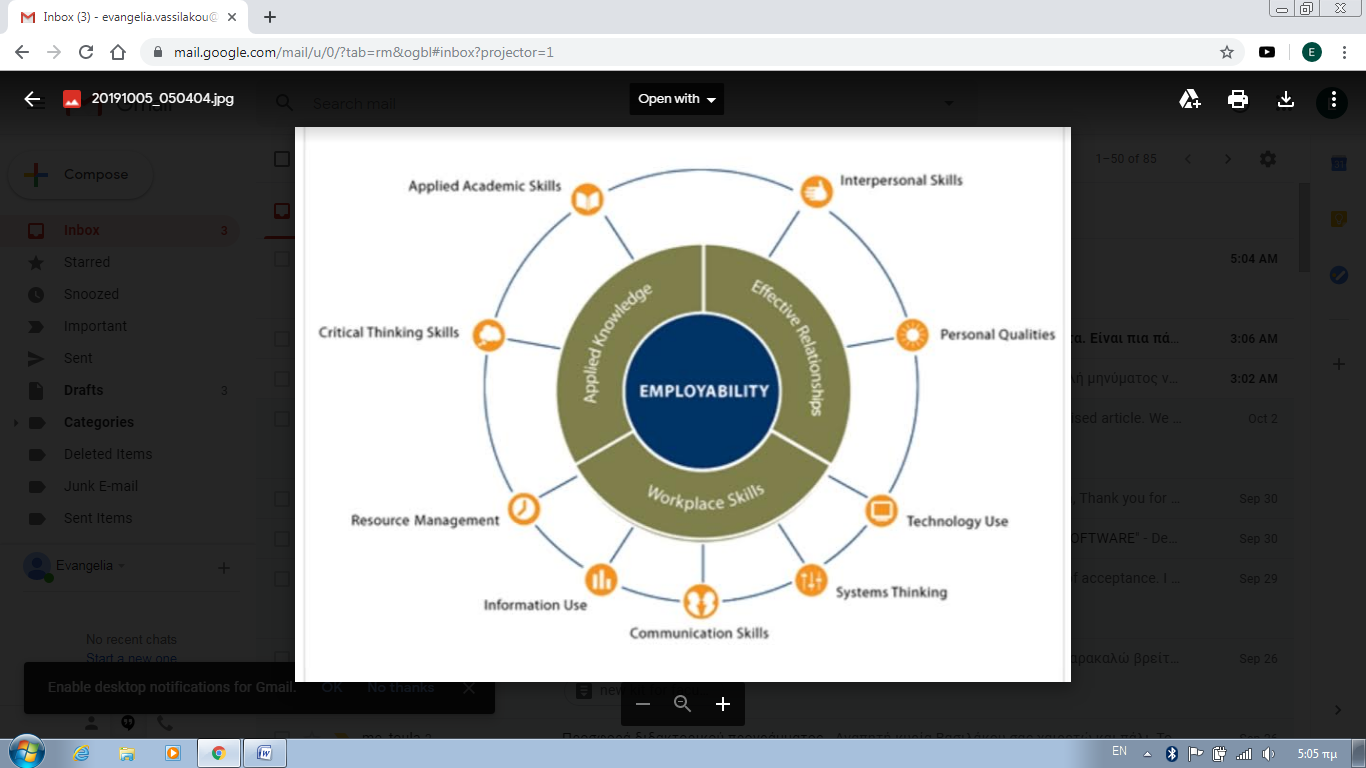This article highlights the concept of “employability” and the importance of acquisition of employability skills. Employability skills are referred to as “the skills acquired to secure and retain a job” (Audu & Yusri & Muhammad 2013, p. 9). Such skills are highly valued by employers who seek to hire good workers having both basic academic and employability skills ranking vocational qualifications higher than academic ones. It is also useful to distinguish between the terms “employability” and “employment” as they are not interchangeable. The former term refers to the ability to function well in a job whereas the latter to the ability to successfully gain a job. Interestingly enough, employability skills are also referred to in the literature as “transferable skills”, or “soft skills” - as opposed to the “hard skills” which are the technical skills - or generic skills” or “life skills” and “nontechnical skills”.
By Vassilakou Evangelia
List of top ten (10) employability skills
Producing higher quality workers entails acquisition of the following top ten employability skills:
- Problem solving skills
- Communication skills
- Adaptability
- Information use
- Collaboration
- Resource management
- Technology use / computer literacy
- Personality traits
- Intrinsic motivation
- Organizational skills
Employability skills Framework
The list of employability skills can also be explained via a framework compiled by the U.S. Department of Education.
Figure 1 Employability skills Framework screenshot

Brief qualitative description of the top ten employability skills
Problem solving skills are valued because they equip students with the ability to face challenges and conflict in today’s world, for example, analyzing facts, devising contingency plans, creating plans and implementing solutions. Communication skills help to effectively communicate with others by building rapport, and empathy. Adaptability is an important skill as it is a demand of the modern world to adjustment to the 21st century changes, especially that of new technologies. Information use facilitates students to be selective to find the right information and locate a single piece of essential data. Collaboration skills rank high as well-organized teams or usage of group dynamics can achieve more in comparison to the attempts of individual members. It is equally important to be able to work with people of different backgrounds, ages and mentality. Resource management involves the small skill set of resources such as time management and effort. Computer skills are also a must and students should keep abreast of emerging technologies related to their selected profession. Personality traits such as professionalism, enthusiasm, confidence and creativity make students more employable than others. Being self-motivated is preferred by prospective employers as it shows willingness to learn and improve at all required levels. Organizational skills require knowledge of setting schedules and prioritizing.
Simple guidelines of teaching certain employability skills
Employability skills can be introduced in the class through classroom activities rather than mere lectures about each skill. Simple ideas for some of these skills are as follows:
{loadmodule mod_random_image,call to action subscribe in articles}
Communication skills
- “Speed interviewing” activity
Students can work in groups of three in which one person is the interviewer, and the other two the interviewee and the observer. Students are given a list of job-related questions and switch roles so as to practice all 3 roles. The observer is given a 1-5 scale under each question to assess the interviewer.
- “Listen and recap” activity
Students can work in pairs. Student 1 selects a job-related topic to talk about and the other listens without speaking. Student 2 must then summarize what he/she heard.
Computer skills
- “Messed-up document”
Students can work on a wrong document with many spelling and formatting mistakes and correct it before submitting it to their “managers” using Microsoft Office program. Alternatively, they can be given instructions on how to create charts using Excel or asked to present using PowerPoint.
Information use
- Students can be taught how to find quality sources using electronic databases and have access to academic articles. They can learn how to search and get the best results, either by choosing a simple search or an advanced search. In particular, training in using possible keywords or the right synonyms to narrow the results or in using filters from the menu of the search box such as article type (abstract, full text) author, issue, and date.
Personality traits –professionalism via redirection of negative attitude
- Typically, professional standards are established at the beginning of the year and personality traits can be modeled. Vocational educators can help students reevaluate the “can’t do it” negative attitude by fostering dialogue in class about possible barriers, personal inhibitions and their removal.
- Special guests like business leaders (CEOs) can be invited to talk in class and discuss the significance of professionalism and a positive attitude.
Conclusion
Considering all the above, developing employability competence is of paramount importance and soft skills need to be embedded into the curriculum of vocational training programs and taught through classroom instruction or outside classroom to propel curriculum enhancement. Vocational educators need to develop students’ work readiness skills for a highly employable and outstanding profile. This is best illustrated by the following quotation:
“Organizations need highly trained employees with academic, technical and social skills to meet the demands of ever-changing technology, global competition and increasing social diversity.” (Zinser 2003 as cited in Andu & Yusri & Muhammed 2013, p. 12).
References
Andu, R., & Yusri, B. K., & Muhammed S. B. (2013). Acquisition of employability skills in technical vocational education: Necessity for the 21st century workforce. Australian Journal of Basic and Applied Sciences, 7(6), 9-14.
https://zety.com/blog/employability-skills
https://cte.ed.gov/initiatives/employabilityskills
